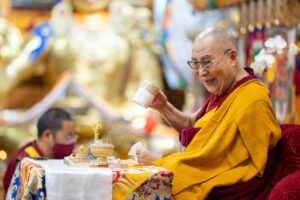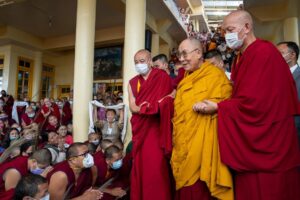
Photo: OHHDL
Saka Dawa, the fourth month of the Tibetan calendar, is considered the most sacred month. It is marked by Buddhists by paying more attention to their dharma practices, including engaging in more spiritual activities. In Dharamshala, the residence of His Holiness the Dalai Lama, Tibetans gathered in Tsuglakhang, the main temple, to pray for the long life of His Holiness the Dalai Lama and for the common cause of Tibet. To coincide with the special occasion, His Holiness the Dalai Lama gave a two-day teaching on June 13 – 14 in person to the public, speaking on the Concise Stages of the Path to Enlightenment of Tsongkhapa and conferring the Avalokiteshvara Jinasagara empowerment in Tsuglakhang. Over 8,500 people from 56 countries attended the teaching.
“Today, Tai Situ Rinpoché is with us. He has requested the Chenrezig Gyalwa Gyatso (Avalokiteshvara Jinasagara) empowerment. Avalokiteshvara can be practiced according to all four classes of tantra, but Gyalwa Gyatso belongs to Highest Yoga Tantra,” said His Holiness.
His Holiness explained that Avalokiteshvara is the supreme deity of compassion and then recited some verses in his praise. His Holiness then started the reading and explanation of Jé Tsongkhapa’s Concise Stages of the Path to Enlightenment saying, “The teaching of the Buddha doesn’t just depend on faith, it’s based on reason. What the Buddha said can be put to the test of reason. Later, the masters of Nalanda, such as Nagarjuna, showed how important it is to examine the Buddha’s teaching in the light of reason and establish that he was an incomparable teacher.
“I’m a Buddhist monk who has studied logic and epistemology. I’ve learned that views like those propounded by the Mind Only School, regarding the non-duality of subject and object, can be put to the test of reason. Today, even scientists admire Buddhism’s vast and reasoned presentation of the workings of the mind and emotions. When we are children in the monasteries we study mind and awareness; we learn about the 51 mental factors. As for me, I’ve studied Collected Topics, mind and logic, as well as the Perfection of Wisdom and Madhyamaka teachings,” continued His Holiness.

Photo: OHHDL
He briefly narrated the history of how the Tibetan language came into existence and how it eventually led to the potential for translating Buddhist literature into Tibetan, saying “Chinese communists have tried unsuccessfully to restrict Tibetan Buddhist culture, and it is clear that Tibetan Buddhist philosophy is more profound than Chinese communism. In contrast to that ideology, Tibetans exercise a kind of Buddhist democracy in their monasteries and nunneries. Tibet’s traditions are vast, deep and profound and have the potential to be combined with modern science.”
On the second day, His Holiness gave the Avalokiteshvara Jinasagara Empowerment. A prayer for His Holiness, composed by the 12thTai Situ Rinpoché was recited, with copies distributed amongst the crowd.
Saka Dawa is an annual month long religious festival which this year took place from May 31 to June 28. Tibetans and followers of Tibetan Buddhism across the world celebrate this festival – the month which is the occasion of Buddha Shakyamuni’s birth, Parinirvana (death) and enlightenment.




 Print
Print Email
Email